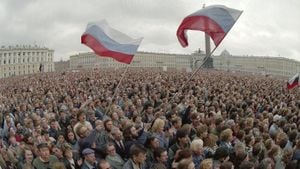Lebanon is facing an unprecedented political crisis, marked by widespread protests and civil unrest as citizens demand substantial changes from their government. The dissatisfaction has been brewing for years due to severe economic conditions, but the movement has escalated since the start of 2023.
Protesters have taken to the streets across the country, voicing their frustrations about the political elite who, they say, have consistently failed to address the dire economic issues affecting their lives. "We are demanding change because the current politicians have failed us," stated activist Fatima Zahra, speaking to Al Jazeera. Her remarks resonate with many who feel ignored by those in power.
The protests, which began earlier this year, have been characterized by large gatherings, marches, and sit-ins. Major cities, particularly Beirut, have seen thousands rallying for their cause. "The people are tired of the same faces and empty promises," declared protest leader Omar Najib when addressing the crowd one evening, according to The Guardian. His words echo the sentiments of countless Lebanese who participated in these demonstrations.
Drivers and commuters have experienced the brunt of the unrest, with major roads blocked by impromptu barricades made of debris and burning tires. Not only traffic has been impacted, but business owners have also reported declines as the demonstrations disrupt daily activities. Shops were forced to shut down, and some businesses suffered damages during clashes between protesters and security forces.
Organizers of the protests have employed social media platforms to spread their messages and rally support, showcasing how digital connections have become integral to the mobilization effort. They use these tools to inform demonstrators about specific locations and times for gatherings to maximize attendance. "We will not relent until our demands are met," posted one activist on Twitter, encapsulating the determination and frustration of the groups involved.
The current economic situation plays a significant background role as well. Lebanon’s economy has suffered from years of governmental neglect, leading to widespread financial woes. Inflation rates have soared, unemployment has skyrocketed, and already struggling citizens have found it increasingly difficult to navigate day-to-day life. With the Lebanese pound losing significant value, many have found their purchasing power drastically reduced.
Facing immense pressure from its population, the government has struggled to formulate effective strategies to address these grievances. Prime Minister Najib Mikati has made pledges to initiate reforms, but critics argue these promises lack substance and seriousness. The distrust among citizens has only frequented, as there's a pervasive feeling among protesters indicating they have heard these vows before without seeing real change.
Despite the government's backing and international acceptance, the continued protests reveal the deep-rooted dissatisfaction within the populace. Activists like Zahra and Najib have emerged as voices for the disenfranchised, channeling the anger and hopes of many seeking not just temporary relief but long-standing reform.
International observers are watching Lebanon with intrigue. The situation has drawn attention to the fragility of political structures and economic stability, raising questions about the future of governance and whether the existing political class can genuinely meet the needs of their citizens. Historical insights suggest Lebanon's governance has often fluctuated between periods of stability and chaos, leading many to ponder how lessons from the past can inform present discussions.
For the Lebanese citizens involved, this is not merely about dissatisfaction with their leaders—it's about survival. Each day continues to highlight the growing gulf between the government and the populace. Slogans demanding accountability reverberate through the streets as protestors are resolute to make their voices heard.
With visions for what the future can be for Lebanon—a more stable political climate and equitable economic practices—citizens are steadfast. Activists like Najib and Zahra represent this cry for change, united against the systemic issues embedded within Lebanese governance.
Moving forward, the intersection between public protest, governmental reform, and international scrutiny will be pivotal. It remains to be seen if the protests will yield the results the populace yearns for or if the frustrations will continue to boil over, pushing citizens and the state toward more significant confrontation.
The coming weeks and months are likely to be formally significant, as the Lebanese people continue to demand change, cultivating hope amid their struggles and reinforcing their identities through communal action and steadfast refusal to accept the status quo of their leadership.



